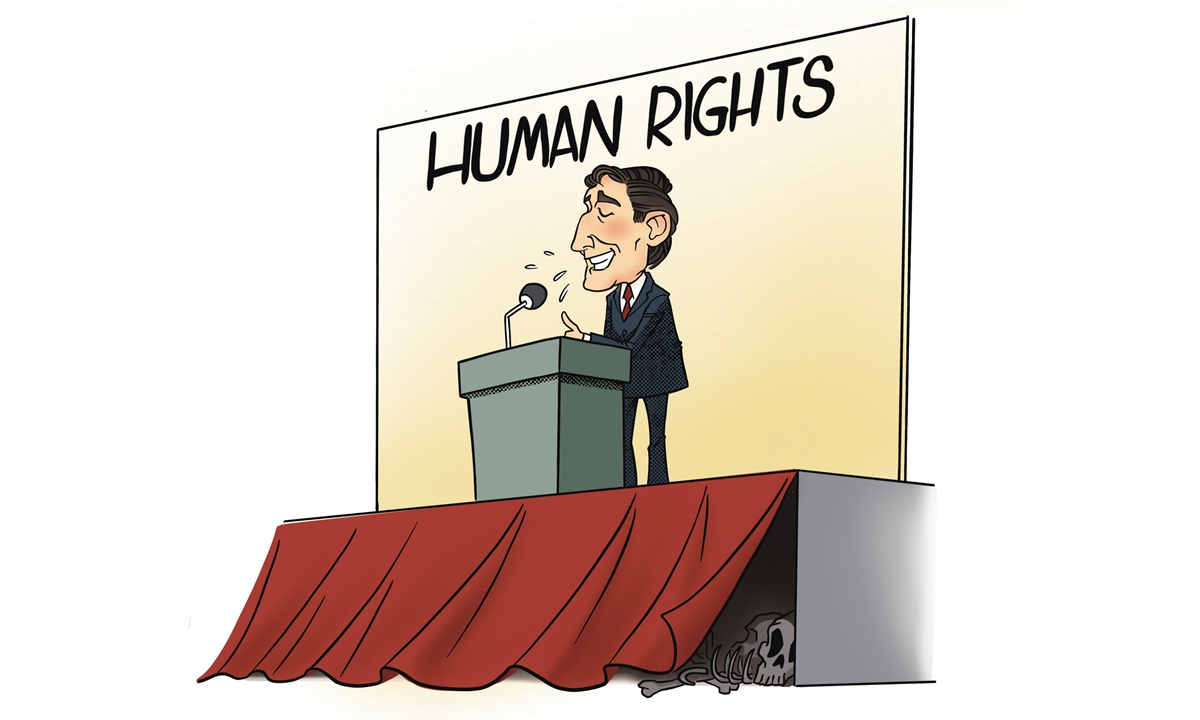Illustration: Liu Rui / GT
Last week, the remains of 215 Indigenous children were found buried in British Columbia, Canada.
The remains, which were found using soil penetrating technology, were in an unmarked mass grave on the grounds of the former Kamloops Indian Residential School in Kamloops, British Columbia.
Beginning in the 19th century and into the 1970s, the Canadian government created and supported a series of publicly funded residential schools across the country. Over 150,000 indigenous children were driven from their families and sent to these institutions during this period, where they were forcibly assimilated into Anglo-Saxon religion and culture.
Children have been forcibly converted to Christianity, banned from speaking their local languages, subjected to severe torture and abuse, and thousands of people are estimated to have died at the hands of the residential school system.
It is true that the Government of Canada under then Prime Minister Stephen Harper formally apologized to the indigenous people of the country in 2008, and acknowledged the horrors that took place under government watch. That same year, the federal government created the Truth and Reconciliation Commission of Canada, with the stated purpose of documenting the horrors and continuing consequences of the residential school system.
And today, although residential schools have been closed for about 50 years, their impact remains. A 2018 CBC News report found that adults who had lived in a residential school as children were more likely to kill themselves and become addicted to alcohol and drugs.
More worryingly, the impact of residential schools was found to have continued from generation to generation. “One in four teenagers on a reserve whose parent attended residential school thought about suicide, compared to one in 10 teenagers who did not have a parent or grandparent,” the CBC article reports.
But despite the official apology from the Canadian government and the establishment of the Truth and Reconciliation Commission more than a decade ago, in many ways very little has been done to reverse the lasting consequences of the Indian residential school system on more than a decade. one million indigenous citizens of Canada. .
Canada has a “long-standing treatment of indigenous peoples as sub-humans, without basic human rights,” wrote Mary Ellen Turpel-Lafond, professor of law at the University of British Columbia, in an article on Sunday. in the Globe & Mail newspaper.
“As individuals, Indigenous peoples have faced racism, stereotypes, disproportionate prejudice and violence from the state, even as this blocked social and economic opportunity. As collectives, indigenous peoples have suffered the dismantling of their government and legal systems. the prohibition of certain aspects of their culture and their society and attacks against their family systems, ”continued Turpel-Lafond.
Clearly, despite Canada’s apologies, the country’s indigenous peoples, both as individuals and as a collective, continue to face widespread persecution and assault on their identity, not to mention the damage. continuing physical and drug addiction that many face.
Canadian Prime Minister Justin Trudeau often likes to say that he is a “country of the rule of law” and that he must start putting more action and less rhetoric into the mistreatment that Canada continues to suffer towards its peoples. indigenous.
One could perhaps be forgiven for thinking that Canada, with its long and shameful history of its own Indigenous citizens, would be inward-looking when it comes to human rights matters. . But somehow, despite the country’s continued failure to properly address the rights of a million of its own citizens, the Canadian government continues to prioritize widespread criticism from other countries, in the whole world.
There is a common proverb originating in Europe, “those who live in greenhouses should not throw stones”, which means that until you get your own house in order, you don’t have to. do not seek to criticize others. But the Government of Canada unfortunately seems convinced that hypocrisy is a virtue. Trudeau, criticized by some as a “signalman of virtue” – meaning he uses rhetoric and little more to solve societal problems – must seriously consider the treatment of indigenous peoples in his own country before campaigning to spread Canada’s values around the world. Hard work to take care of his own people is no small feat, and every day that Trudeau spends bragging about his own liberal good faith, while continuing to ignore at best, and perpetuate at worst, l continued assault on indigenous peoples. , is a tragic and preventable mistake.
The author writes on the relations between China and the West. [email protected]

